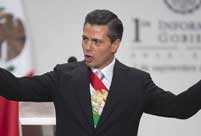BEIJING, Sept. 5 -- G20 should pay more attention to the voices of developing countries and work together for fairer global governance.
The G20 summit to be held on Thursday and Friday in the Russian city of St. Petersburg is expected to seek macroeconomic cooperation and coordination to give a boost to the nascent global economic recovery. The Group of 20 Finance Ministers and Central Bank Governors was created in 1999 as a forum for cooperation and consultation for the global economic architecture in the 21st century. With the onset of the global financial crisis in 2008, the G20 brought the group's leaders together for their first summit in Washington. Since then, the G20 has achieved concrete outcomes in responding to the global financial crisis, stabilizing financial markets and fostering steady, sustainable and balanced global growth.
China attaches great importance to the G20, a platform where it participates in global economic governance both as a founder and a key player. The country has even made participation in the G20 and other global economic governance mechanisms an integral part of its 12th Five-Year Plan (2011-15). During the fifth round of the China-US Strategic and Economic Dialogue in July, Beijing and Washington agreed to strengthen macroeconomic policy coordination under multilateral frameworks including the G20.
There will also be an informal meeting of the leaders of the BRICS countries Brazil, Russia, India, China and South Africa prior to the G20 summit and the five leaders will exchange views and coordinate positions on major international issues. This will help improve the efficiency of the summit in St. Petersburg.
As an emerging economy, China strives to facilitate South-South cooperation and urges the G20 to pay more attention to the interests of the developing world. In the context of South-South cooperation, at the sixth G20 summit in 2011 in Cannes, France, China announced it would grant zero-tariff treatment to 97 percent of the tariff items exported to China from the least developed countries that have diplomatic ties with China.
Over the past few years, China has made its voice heard in international governing bodies and substantially exercised its influence in building international institutions by making good use of the G20 platform. For instance, China has actively participated in G20 working groups, which, to a large extent, set the tone for multilateral economic cooperation in the future. For instance, earlier this year, Beijing joined the first Framework Working Group meeting in New Delhi and the first Energy Sustainability Working Group meeting in Moscow.
 |
 Mexican president delivers first State of Nation address
Mexican president delivers first State of Nation address Highlights of MAKS 2013 Int'l Aviation and Space Show
Highlights of MAKS 2013 Int'l Aviation and Space Show  10th China-ASEAN Expo opens in Nanning
10th China-ASEAN Expo opens in Nanning Baby born to save his sister - the story of a savior sibling
Baby born to save his sister - the story of a savior sibling Lady of mystery: Female SWAT team in prison disclosed
Lady of mystery: Female SWAT team in prison disclosed  Single mother, baby live in KFC restaurant for months
Single mother, baby live in KFC restaurant for months Top 10 naked hotels in the world
Top 10 naked hotels in the world The most gorgeous Chinese women in the eyes of foreigners
The most gorgeous Chinese women in the eyes of foreigners A collection of bizarre rooftop buildings around China
A collection of bizarre rooftop buildings around China Putin intimate contacts with marine animals
Putin intimate contacts with marine animals China's frigate 'Bengbu'in fire training
China's frigate 'Bengbu'in fire training Fresh students 'forced' to register in university independently
Fresh students 'forced' to register in university independently 2013 Taiwan Int'l Tourism Expo kicks off in Taipei
2013 Taiwan Int'l Tourism Expo kicks off in Taipei Photo story: Take a gap year
Photo story: Take a gap year Nokia's Global Headquarters: visiting a declining empire
Nokia's Global Headquarters: visiting a declining empireDay|Week|Month